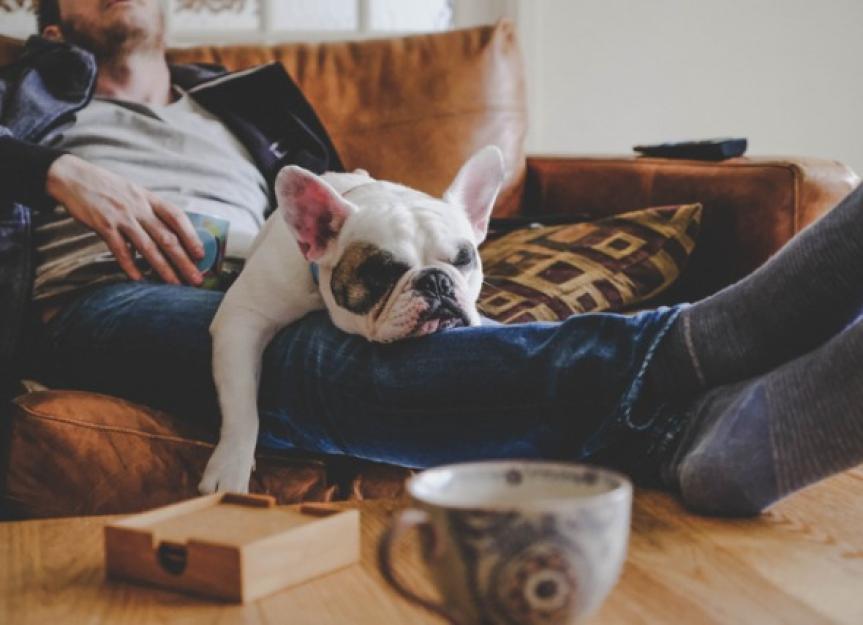The life of a dog may seem like an endless cycle of sleep, eat, repeat. But have you ever wondered how long dogs actually sleep each day? In this article, we will delve into the fascinating world of canine slumber and uncover the reasons behind their sleeping habits. So, let’s dive in and explore the incredible world of doggy dreams!
How Long Do Dogs Sleep Each Day?
On average, dogs spend about 50% of their day sleeping. That’s around 12 hours in a 24-hour period! However, the amount of sleep can vary depending on the breed, age, and overall health of the dog. Puppies, large-breed dogs, and older dogs tend to sleep more, while small-breed dogs and working dogs may sleep less.
In addition to their actual sleep time, dogs also spend around 30% of their awake hours in a state of “loafing.” This is when they are awake but not actively doing anything. They may be lying down, observing their surroundings, or simply enjoying a moment of relaxation. In total, dogs spend an astonishing 80% of their day not actively engaged in any specific activity.
Why Do Dogs Sleep So Much?
Unlike humans who often ignore their body’s signals for rest, dogs listen to their bodies and sleep when they need to. Sleep is vital for various aspects of a dog’s well-being, including brain development, memory consolidation, and immune system function. It is during sleep that their brains organize information and recharge for the adventures that await them.
Additionally, sleep deprivation can have negative effects on a dog’s mood and overall health. Research suggests that lack of sleep may make dogs more prone to infections and can contribute to a decline in their overall mental and physical well-being. So, the next time you see your furry friend dozing off, remember that they are not just lounging around – they are taking care of themselves!
What If My Dog Sleeps More Than Usual?
While it’s normal for dogs to sleep a lot, it’s essential to pay attention to any changes in their sleep patterns. If you notice that your dog is sleeping significantly more than usual, it could be a sign of underlying health issues. Conditions such as diabetes, kidney disease, hypothyroidism, heart disease, and arthritis can all affect a dog’s sleep patterns.
If your dog’s sleep habits have changed or they are unusually difficult to wake up, it’s time to consult with a veterinarian. Keeping a sleep log can help your vet identify any patterns or potential causes of your dog’s excessive sleepiness. Remember, your dog’s sleep habits can provide valuable insights into their overall health and well-being.
What If My Dog Is Restless at Night?
Just like humans, dogs can experience trouble falling asleep at night, especially as they age. Older dogs, particularly those with canine cognitive dysfunction (similar to Alzheimer’s disease in humans), may exhibit restlessness and confusion during the evening hours. This phenomenon, often referred to as “sundowning,” can disrupt their sleep patterns.
To address this, some dogs may benefit from night lights or having a TV or radio playing softly in the background. In severe cases, medication may be prescribed to manage sleep disruptions. If your dog suddenly needs to go out more frequently at night, it could be a sign of an underlying medical condition or a change in their routine. Consulting with a vet can help determine the cause and find the best solution.
Are There Sleep Aids for Dogs?
While there is no one-size-fits-all sleep aid for dogs, there are a few strategies you can try to help your pup get better sleep. Pheromone products, such as plug-in diffusers or sprays, can help calm anxious dogs and create a more relaxing environment. Always consult with your veterinarian before trying any medication, but in some cases, a light dose of Benadryl may help dogs sleep.
Creating a sleep-friendly environment is also important. Some dogs prefer to sleep in a kennel with the door open, while others may benefit from a night light or the soothing sounds of a radio or TV. Discovering what works best for your dog may require some trial and error, but with patience and the guidance of your vet, you can find the ideal sleep routine for your furry friend.
Frequently Asked Questions
1. How much sleep do dogs need?
On average, dogs need around 12 hours of sleep in a 24-hour period, with puppies, larger breeds, and older dogs requiring more sleep.
2. Why do dogs sleep so much?
Sleep is crucial for a dog’s brain development, memory consolidation, and overall well-being. It helps them recover from daily activities and supports their immune system.
3. What should I do if my dog’s sleep patterns change?
If your dog’s sleep habits change significantly or they are unusually difficult to wake up, consult with a veterinarian. There may be underlying health issues that need to be addressed.
4. How can I help my restless dog sleep at night?
For older dogs experiencing restlessness at night, try providing night lights, playing soft background music, or consult with a vet who may recommend medication to manage sleep disruptions.
5. Are there sleep aids for dogs?
While there is no universal sleep aid for dogs, pheromone products and mild sedatives, under veterinary guidance, may help calm and settle anxious dogs.
Conclusion
Dogs truly understand the importance of a good night’s sleep. From brain development to immune system support, sleep plays a vital role in keeping our furry friends happy and healthy. So, if you ever find yourself wondering how long is an hour to a dog, remember that their sleep habits are a reflection of their well-being. Embrace the sleepy moments, and cherish the times they are by your side, ready for the next adventure! To learn more about creating a healthy and fulfilling life for your dog, visit Pawsoha.
